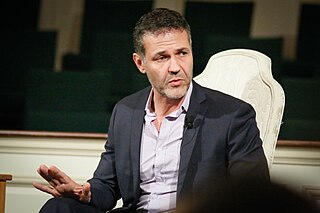A proverb or an adage is a simple, traditional saying that expresses a perceived truth based on common sense or experience. Proverbs are often metaphorical and are an example of formulaic language. A proverbial phrase or a proverbial expression is a type of a conventional saying similar to proverbs and transmitted by oral tradition. The difference is that a proverb is a fixed expression, while a proverbial phrase permits alterations to fit the grammar of the context. Collectively, they form a genre of folklore.

Dari, Dari Persian, or Eastern Persian is the variety of the Persian language spoken in Afghanistan. Dari Persian is the Afghan government's official term for the Persian language; it is known as Afghan Persian or Eastern Persian in many Western sources. The decision to rename the local variety of Persian in 1964 was more political than linguistic to support an Afghan state narrative. Dari Persian is most closely related to Tajiki Persian as spoken in Tajikistan and the two share many phonological and lexical similarities. Apart from a few basics of vocabulary, there is little difference between formal written Persian of Afghanistan and Iran; the languages are mutually intelligible. Dari Persian is the official language for approximately 35 million people in Afghanistan and it serves as the common language for inter-ethnic communication in the country.

Ali Ahmad Jalali is an Afghan politician, diplomat, and academic. Jalali served as the Minister of Interior from January 2003 to September 2005. He has also been a distinguished professor at the Near East South Asia Center for Strategic Studies (NESA) at the National Defense University in Washington, D.C. In August 2021, amid the collapse of the US-backed Afghan government, Jalali was rumored to become the leader of the Taliban-controlled interim Afghan government, which he has denied on Twitter as "fake news."

Khaled Hosseini is an Afghan-American novelist, UNHCR goodwill ambassador, and former physician. His debut novel The Kite Runner (2003) was a critical and commercial success; the book and his subsequent novels have all been at least partially set in Afghanistan and have featured an Afghan as the protagonist. Hosseini's novels have enlightened the global audience about Afghanistan's people and culture.

The culture of Afghanistan has persisted for centuries and encompasses the cultural diversity of the nation. Afghanistan's culture is historically strongly connected to nearby Persia, including the same religion, as the people of both countries have lived together for thousands of years. Its location at the crossroads of Central, South and Western Asia historically made it a hub of diversity, dubbed by one historian as the "roundabout of the ancient world".

Afghanistan is a linguistically-diverse nation, with upwards of 40 distinct languages spoken, though many of these are localized dialects and/or endangered. Today, Dari and Pashto are two of the most prominent languages spoken, and have shared official status under the various Afghani governments. Dari, as a shared language between multiple ethnic groups in the country, has, historically, served as a lingua franca between different groups in the region, and is the most widely understood language in the country.

Pashto literature refers to literature and poetry in Pashto language. The history of Pashto literature spreads over five thousands years having its roots in the oral tradition of Tappa. However, the first recorded period begins in 7th century with Amir Kror Suri. Later, Pir Roshan (1526–1574), who founded his own Sufi school of thoughts and began to preach his beliefs. He gave Pashto prose and poetry a new and powerful tone with a rich literary legacy. Khair-ul-Bayan, oft-quoted and bitterly criticized thesis, is most probably the first book on Sufism in Pashto literature. Among his disciples are some of the most distinguished poets, writers, scholars and sufis, like Arzani, Mukhlis, Mirza Khan Ansari, Daulat and Wasil, whose poetic works are well preserved. Akhund Darweza (1533–1615), a popular religious leader and scholar gave a powerful counterblast to Bayazid’s movement in the shape of Makhzanul Islam. He and his disciples have enriched the Pashto language and literature by writing several books of prose.
Nangarhar University is a government-funded higher learning institution in Jalalabad, Afghanistan. It is the second largest university in Afghanistan. It has 13 colleges and 15,385 students.

The history of Arabs in Afghanistan spans over one millennium since the 7th century. Most of the early Arabs gradually lost their Arabic hegemony and ultimately mixed with the local population, though they are still considered a cognizably distinct ethnic group according to the Constitution of Afghanistan. Afghans who carry Sayed or Quraishi in their names usually claim Arab ancestry.
The mass media in Afghanistan is monitored by the Ministry of Information and Culture (MoIC), and includes broadcasting, digital and printing. It is mainly in Dari and Pashto, the official languages of the nation. It was reported in 2019 that Afghanistan had over 107 TV stations and 284 radio stations, including 100s of print media and over 1,800 online media outlets. After the return of the Islamic Emirate of Afghanistan (IEA) in 2021, there was a concern that the mass media will significantly decrease in the country. The number of digital media outlets is steadily increasing with the help of Facebook, Instagram, TikTok, Twitter, YouTube, and other such online platforms. IEA's spokesman Zabihullah Mujahid suggested that the media should be in line with Sharia and national interests.

Zabihullah Mujahid is an Afghan spokesperson who has been the chief spokesman for the internationally unrecognized Taliban regime of Islamic Emirate of Afghanistan since 25 October 2021 and their Deputy Minister of Information and Culture since 7 September 2021. He has long served as one of several spokesmen for the Taliban, the others being Suhail Shaheen and Yousef Ahmadi. Mujahid commented mainly on the Taliban's activities in eastern, northern, and central Afghanistan, while Ahmadi focused on the western and southern regions. In addition to being the government's main spokesman, Mujahid serves as a personal spokesman for Supreme Leader Hibatullah Akhundzada.

Wolfgang Mieder is a retired professor of German and folklore who taught for 50 years at the University of Vermont, in Burlington, Vermont, USA. He is a graduate of Olivet College (BA), the University of Michigan (MA), and Michigan State University (PhD). He has been a guest speaker at the University of Freiburg in Germany, the country where he was born.
Mohammad Asef Soltanzadeh was born in Kabul, Afghanistan in 1964 and moved to Pakistan. Then in 1985, he moved to Iran and then in 2002, he moved to Denmark. He is a writer specialising in prose and drama. He writes primarily in Dari Persian.

Nancy Hatch Dupree was an American historian whose work primarily focused on the history of modern Afghanistan. She was the director of the Afghanistan Center at Kabul University and author of five books that she compiled while studying the history of Afghanistan from 1962 until the late 1970s, writing about tourism and history of Bamyan, Kabul, Kandahar, Herat, Mazar-i-Sharif and so on. She was fondly called the "grandmother of Afghanistan", having spent much of her life there or with Afghans abroad.
Motasim Billah Mazhabi is a citizen of Afghanistan who was a candidate in Afghanistan's 2009 Presidential elections.

Abbas Noyan is an ethnic Hazara politician. He is Afghanistan's ambassador to Sweden, representing the Islamic Republic that fell in August 2021 to the Taliban. Previously he served as a Member of Parliament to Wolesi Jirga, the lower house, representing the people of Kabul province from 2005 to 2010. In 2005, he ranked seventh among candidates from Kabul province, quickly rising to one of the most prominent and active representatives at the Wolesi Jirga. During his tenure, he advocated for women's rights, education for all, a responsive and accountable government, and a strong rule of law. Noyan has worked across ethnic and sectarian divides in representing his constituents, and sought to bridge those divides by establishing a multi-ethnic political party.

Across Afghanistan, proverbs are a valued part of speaking, both publicly and in conversations. Afghans "use proverbs in their daily conversations far more than Westerners do, and with greater effect". The most extensive proverb collections in Afghan languages are in Pashto and Dari, the two official languages in Afghanistan.
Abdul Bari Jahani is an Afghan poet, novelist, historian and journalist. He wrote the lyrics for the national anthem of the Islamic Republic of Afghanistan.
Azizullah Royesh is a Hazara, social activist, teacher and writer from Afghanistan.

Afghan literature or literature of Afghanistan refers to the literature produced in modern-day Afghanistan. Influenced by Central and South Asian literature, it is predominantly written in two native and official languages of Afghanistan: Dari and Pashto. Some regional languages such as Uzbek, Turkmen, Balochi, and Pashayi also appear in Afghan literature. While Afghanistan is a multilingual country, these languages are generally used as oral compositions and written texts by the Afghan writers and in Afghan curriculum. Its literature is highly influenced by Persian and Arabic literature in addition to Central and South Asia.











